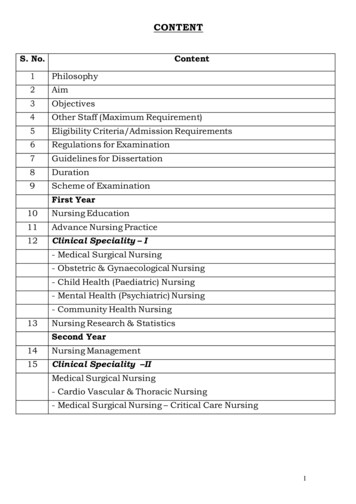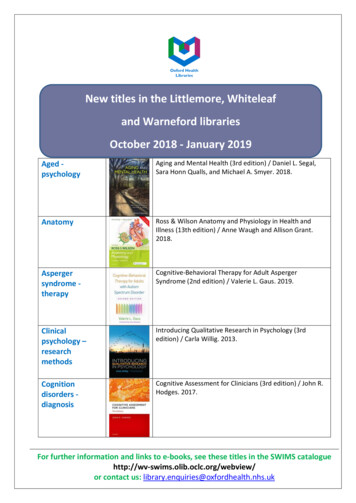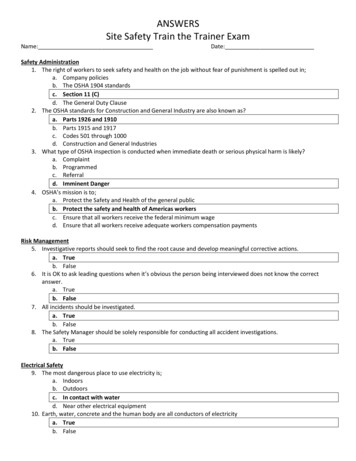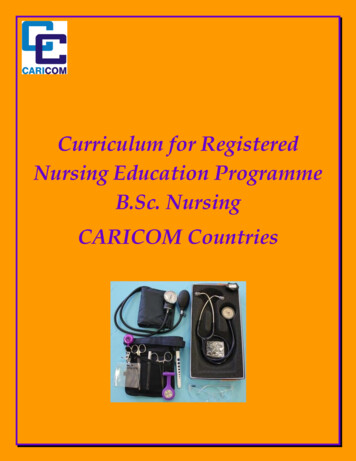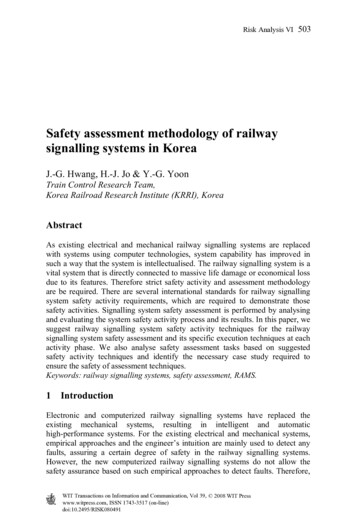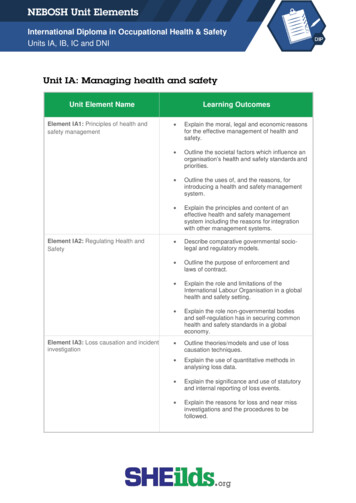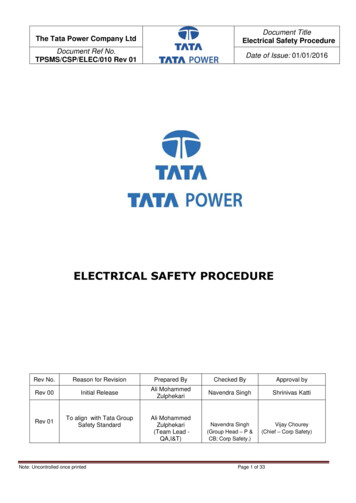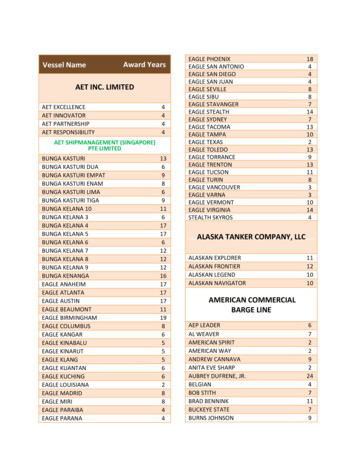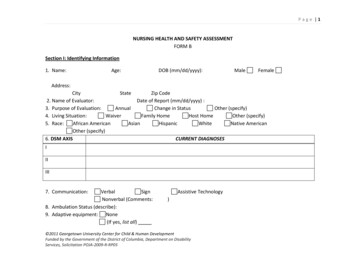
Transcription
Page 1NURSING HEALTH AND SAFETY ASSESSMENTFORM BSection I: Identifying Information1. Name:Age:DOB (mm/dd/yyyy):MaleFemaleAddress:CityStateZip Code2. Name of Evaluator:Date of Report (mm/dd/yyyy) :3. Purpose of Evaluation:AnnualChange in StatusOther (specify)4. Living Situation:WaiverFamily HomeHost HomeOther (specify)5. Race:African AmericanAsianHispanicWhiteNative AmericanOther (specify)6. DSM AXISCURRENT DIAGNOSESIIIIII7. Communication:VerbalSignNonverbal (Comments:8. Ambulation Status (describe):9. Adaptive equipment: None(If yes, list all)Assistive Technology) 2011 Georgetown University Center for Child & Human DevelopmentFunded by the Government of the District of Columbia, Department on DisabilityServices, Solicitation POJA-2009-R-RP05
Page 210. Medical equipment: (include glucose monitoring, CPAP, respiratory supplies, medical alert device, etc)Indicate type and frequency of use:Is the individual able to utilize equipment independently?With verbal promptsOther (specify)11. History of Falls:NoYes (specify frequency & follow-up)Section II: Brief Health History12. Hospitalizations and emergency room visits during the past year: (Dates and Reasons)13. Illnesses during the past year:14. Significant Family History Information obtained from health record Information obtained from family member:(If Yes, give name:) Relationship to individual: Date (mm/dd/yyyy):YesYes15. Family History of Cardiac Problems/Hypertension16. Family History of Diabetes 2011 Georgetown University Center for Child & Human DevelopmentFunded by the Government of the District of Columbia, Department on DisabilityServices, Solicitation POJA-2009-R-RP05NoNoNone
Page 317. Family History of Seizures18. Family History of Cancer19. Family History of Known Genetic Disorders20. Other Family HistorySection III: Health Data21. Allergies:FoodEnvironmentalIf any reaction, identify antigen & clinical reaction:EpiPen: YesNoMedication Reaction22. Current Medical Information:Medical Problem (s) Requiring Nursing MonitoringDate of last evaluation and comments: 2011 Georgetown University Center for Child & Human DevelopmentFunded by the Government of the District of Columbia, Department on DisabilityServices, Solicitation POJA-2009-R-RP05No Known /yyyy)
Page 4Date of last evaluation and comments:Date of last evaluation and comments:Date of last evaluation and comments:Date of last evaluation and comments:Date of last evaluation and comments:Date of last evaluation and comments:Date of last evaluation and comments:Date of last evaluation and comments:Date of last evaluation and comments: 2011 Georgetown University Center for Child & Human DevelopmentFunded by the Government of the District of Columbia, Department on DisabilityServices, Solicitation POJA-2009-R-RP05
Page 5**INSTRUCTIONS: Document findings WNL (within normal limits/negative); NWNL (not within normal limits).Further explanation is needed for all NWNL findings.SystemWNL NWNL Description23. Emotional Mental Status(Indicate frequency,duration,precipitators)1. Functional Orientation2. Nervousness/anxiety3. Sadness/loneliness4. Fearful/withdrawn5. Irritable/angryDate of last psychological exam (mm/dd/yyyy):None indicatedResults:Date of last psychiatric exam(mm/dd/yyyy) :None indicatedResults:24. Maladaptive Behavior(Indicate frequency,duration,precipitators)1. Aggressive/ Assaultive2. Destructive3. Self-injurious4. PICA5. Running away6. Verbal abusePsychotropic medications:YesNoIf Yes, date of consent, provided by whom?Date of last Behavior Support Plan (BSP) (mm/dd/yyyy):None indicatedTargeted behaviors:Date of consent for BSP (mm/dd/yyyy): 2011 Georgetown University Center for Child & Human DevelopmentFunded by the Government of the District of Columbia, Department on DisabilityServices, Solicitation POJA-2009-R-RP05
Page 625. Consent ProceduresIndividual has the capacity to make medical decisions: Individual has a substitute health care decision maker:YesNoYesNoTo obtain consent contact:Name:Phone:In a medical emergency two physicians may agree to proceed with medical intervention.Advance Directives/DNRNone26. Individual’s Health ConcernsIndividual’s Perspective:Care Provider’s Perspective (give name/title):Family Member’s perspective (give name/relationship):27. Seizure Disorder: TypeFrequencyN/ADescribe individual’s awareness of seizure disorder and coping strategies:28. Current Medications:Date StartedMedicationDosage Times Route(mm/dd/yyyy) 2011 Georgetown University Center for Child & Human DevelopmentFunded by the Government of the District of Columbia, Department on DisabilityServices, Solicitation POJA-2009-R-RP05ReasonDate to beDiscontinued(mm/dd/yyyy)
Page 7 2011 Georgetown University Center for Child & Human DevelopmentFunded by the Government of the District of Columbia, Department on DisabilityServices, Solicitation POJA-2009-R-RP05
Page 829. Medication regimen (indicate one):no changes over past 3 monthschanges over past 3 months(Describe changes:)30. Is self administration program utilized for any of the above listed medications?If Yes, is the program for all medications?Or, some medications?If some, then list the medications:Date of most recent self administration assessment (mm/dd/yyyy):YesNo31. Vital Signs & Nutritional IssuesDate:/ /B/P:Ideal Body Weight:Diet:Comments:T:P:R:Ht:Not determined*Section III: Health Skills AssessmentIndividual32. Participates in the selection of health care providers as possible 2011 Georgetown University Center for Child & Human DevelopmentFunded by the Government of the District of Columbia, Department on DisabilityServices, Solicitation POJA-2009-R-RP05Wt:YesNoComments
Page 933. Contacts primary care provider independently for appointments, concerns34. Requires assistance to contact primary care provider35. Understands own diagnoses and health status (specify)all36. Understands prescribed treatmentssomeallsome37. Requires assistance to understand treatments (if yes, specify all who assist)StaffNurseFamilyGuardian38. Complies with health recommendations and treatment to promote optimalhealth39. Understands impact of non-compliance with healthrecommendations/treatments40. Receives training/counseling about non-compliance with health issues (if yes,specify from whom)Support TeamMDRNOther41. Attends medical appointments independently (if no, specify type of assistanceneeded)TransportationStaff to accompanyOther42. Promptly, appropriately, and accurately reports abnormal health conditions (ifyes, specify to whom reports)StaffFamily/GuardianPrimary Care Provider43. Knows how to use 911 to contact emergency personnel44. Has emergency device to contact assistance (specify) 2011 Georgetown University Center for Child & Human DevelopmentFunded by the Government of the District of Columbia, Department on DisabilityServices, Solicitation POJA-2009-R-RP05
P a g e 1045. Knows how to evacuate self from danger: fire, intruders, etc.46. Performs first aid techniques: control bleeding, clean wound, apply band-aid47. Participates in exercise (specify)48. Drinks alcohol? If yes, describe amount/frequency)49. Knows and understands risks and outcome of alcohol abuse50. Uses street drugs? (If yes, give type/frequency)51. Knows and understands risks and outcome of drug abuse52. Uses cigaretteschewing tobacco(If yes, give amount/frequency)53. Knows and understands risks and outcome of tobacco use*Maximizing life potentialCategory: SexualityStable andpredictableStable andunpredictable54. Knows, understands sexual anatomy ofmales/females55. Knows, understands and practices safe sexualbehaviors56. Is sexually active? 2011 Georgetown University Center for Child & Human DevelopmentFunded by the Government of the District of Columbia, Department on DisabilityServices, Solicitation POJA-2009-R-RP05Unstable andpredictableUnstable andUnpredictableComments
P a g e 1157. Independent in fulfilling individual need toexpress sexuality through personal presentation,relationshipsor activities.58. Able to express sexuality independently.Requiressome assistance with facilitating privacy,relationship opportunities or personalpresentation.59. Needs assistance to express sexuality for e.g.personal presentation. Enjoyment of desiredrelationships requires management of theenvironment.60. Needs staff assistance in establishingappropriate environment to fulfill sexual needs andexpression of sexuality. May need specialistassessment, such as from a psychosexual therapist.61. Exhibits significant challenging behavior inrespect of sexuality. May need therapeuticintervention and/or close supervision or support.*Prevention and relief of distress (Choose one of the following numbers and prompt levels)Category: Pain ControlIndependent62. Pain free. Self caring in the management ofpain. 2011 Georgetown University Center for Child & Human DevelopmentFunded by the Government of the District of Columbia, Department on DisabilityServices, Solicitation dCompletelyDependentComments
P a g e 1263. Experiences pain which they are able to manageand can ask when treatment is required.64. Experiences regular or protracted pain whichcannot be managed unsupported, although needscan be expressed. Needs assistance, supervision orsupport in controlling the pain.65. Able to express verbally protracted pain, butunable to specify the type of pain or its effects.Requires a range of interventions to control pain.66. Unable to describe needs in respect of pain. Thelevel of pain experienced can only be seen throughbehavior, facial or bodily expression and emotionalstate. Requires complex interventions.67. Health PassportHow to use the Health Passport:was reviewedwas not reviewedComments:68. Health Form 1All laboratory tests and screenings that are recommended on the Health Form 1 based on age/gender have been reviewed:YesNoList any tests or screenings that are currently pending:Within the next 12 months, the need for the following tests will be discussed with the primary care physician:69. Immunization Status:Immunizations/VaccinationsDate of last TETANUS (mm/dd/yyyy):Date of last INFLUENZA (mm/dd/yyyy): 2011 Georgetown University Center for Child & Human DevelopmentFunded by the Government of the District of Columbia, Department on DisabilityServices, Solicitation POJA-2009-R-RP05
P a g e 13Date of PNEUMOVAX (mm/dd/yyyy):HEPATITIS B Surface Antigen:Date of PPD/Chest X-Ray (mm/dd/yyyy):Results:HEPATITIS B Immunity:Other: (Give name and date)Date HEP B Vaccine Series Completed (mm/dd/yyyy):70. Summary of Findings:For information regarding specific areas of concern and expected outcomes, see the attached Health Management Care Plan.Name of Evaluator & TitleSignature of Evaluator* Adapted from Nursing Assessment and Older People (2004). Royal College of Nursing, London.** Adapted from CT Department of Developmental Services, Nursing Health & Safety Assessment, 2006. 2011 Georgetown University Center for Child & Human DevelopmentFunded by the Government of the District of Columbia, Department on DisabilityServices, Solicitation POJA-2009-R-RP05
Date of last psychiatric exam(mm/dd/yyyy) : None indicated Results: 24. Maladaptive Behavior 1. Aggressive/ Assaultive 2. Destructive 3. Self-injurious 4. . Nursing Health & Safety Assessment, 2006. Title: NURSING HEALTH AND SAFETY ASSESSMENT Author: Teresita Cuna Created Date:
